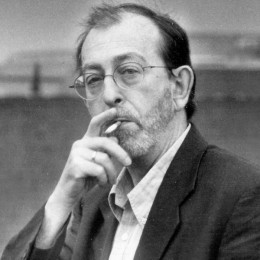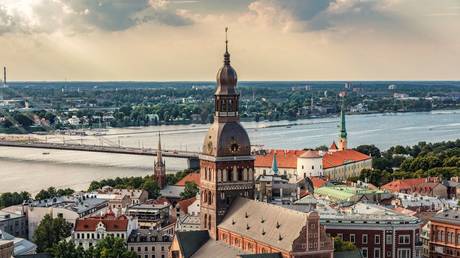Whoever Runs Culture Always Ends Up Dominating the State
The following interview, which was first published on June 27, is being reprinted with the permission of the interviewer from the blog of the Turkish writer Eren Yesilyurt.
Alain de Benoist is a French writer and thinker, one of the leading figures of the European New Right movement. De Benoist has written many important works, especially on identity, culture, and nationalism. I asked Benoist about the Conservative Revolution, Right-wing Gramsciism, the elections in France, and many other topics. This is the first interview with de Benoist in Turkey.
What do you think of the concept of “Conservative Revolution”? What does the Conservative Revolution mean today? As a French intellectual, you have a particular interest in the German intellectuals of the last century, especially Friedrich Nietzsche, Carl Schmitt, and Ernst Jünger. Let’s start with your interest in the Conservative Revolution and Conservative Revolutionary intellectuals.
The expression “Conservative Revolution” obviously sounds like an oxymoron, a contradiction in terms. But it is nothing of the sort. When you have to make radical changes to preserve what you want to preserve, the approach automatically becomes revolutionary. If we think, for example, that preserving ecosystems requires putting an end to the capitalist system, which is primarily responsible for pollution and ecological damage, we can immediately appreciate the scale of the change. Many authors (and not only in Germany) have been described as Conservative Revolutionaries, starting with Hegel, Walter Benjamin, and Gustav Landauer.
It should also be remembered that what we now call the German Conservative Revolution (CR) was never a self-description. The term was coined by the Swiss-German essayist Armin Mohler, in a well-known thesis published in 1951, to designate several hundred authors and theoreticians who, under the Weimar Republic, distinguished themselves from both the traditional Right and National Socialism. Mohler distinguished several different currents within the CR, the main ones being the Young Conservatives, the National Revolutionaries, and the representatives of the Völkisch movement.
You are looking for a Right-wing cultural revolution against Left-wing cultural hegemony. We know that you are interested in intellectuals such as Schmitt and Jünger, as well as Marxist intellectuals such as Antonio Gramsci. You even describe yourself as a “Right-wing Gramscianist.” What have Right-wing intellectuals learned from Gramsci? Why is cultural hegemony so important? In this context, what is the meaning of the concept of “metapolitics,” a concept of your own?
Antonio Gramsci, one of the leaders of the Italian Communist Party, was the first to put forward the thesis that no political revolution is possible unless minds have already been imbued with the values, themes, and “myths” conveyed by the supporters of that revolution. In other words, he argued that the cultural revolution was the sine qua non of any political revolution, and he assigned this task to what he called the “organic intellectuals.” The classic example is the French Revolution of 1789, which would probably not have been possible if the elites of the time had not first been won over to the new ideas by the philosophy of the Enlightenment. Similarly, it could be said that Lenin was first made possible by Marx.

You can buy Alain de Benoist’s Ernst Jünger between the Gods and the Titans here.
The notion of “metapolitics,” which has often been misunderstood, refers above all to the work of “organic intellectuals.” Metapolitics is what lies beyond everyday politics: In certain periods, it is more important to devote oneself to the work of ideas, to a cultural and theoretical effort, than to embark on premature political ventures that are doomed to failure.
“Gramsciism” does not necessarily refer to a particular family of thought. The clear awareness that culture is not something secondary to political action can be taken up in all circles. It is in this sense that I have been able to speak of “Right-wing Gramsciism.”
I would add that at the turn of the 1970s, I realized that we were in the process of changing the world, and that the concepts and theories of previous years were becoming increasingly obsolete as a result. The great cycle of modernity seemed to be coming to an end, while the world to come was still very uncertain. I came to the conclusion that we had to start from scratch and build an intellectual doctrine without worrying about the provenance of its components. For me, there are no Right-wing ideas and Left-wing ideas, but above all there are right ideas and wrong ideas.
May 1968 was undoubtedly a turning point, but we shouldn’t overestimate it, either. Above all, we must realize that May ’68 saw the emergence of two currents that were associated at the time, but which were in reality very alien to each other. On the one hand, there were sincere revolutionaries who wanted to break away from the society of the spectacle, as theorized by Guy Debord and later by Jean Baudrillard, and put an end to the logic of profit; and on the other, liberal-libertarians who wanted to find “the beach under the pebbles” in a purely hedonistic way. The representatives of this tendency quickly realized that the capitalist system and the ideology of human rights were best placed to enable them to achieve unlimited freedom and the “revolution of desire.”
From this point of view, I wouldn’t say that we are still living in a cultural hegemony created by May ’68, but rather that we are undergoing the reign of a dominant ideology based on an anthropology of the liberal type, to which many of the former actors of May ’68 have rallied. There is nothing inevitable about the undeniable hegemony of this dominant ideology, whose two main vectors are the ideology of progress and the ideology of human rights. As for the argument you quote (“the Rightists run the State, but we run culture”), it seems to me to be extremely hypocritical, which is precisely what Gramsci helps us to understand: Whoever runs culture always ends up dominating the State. The proof is that those who run the State today are themselves influenced and manipulated by the dominant ideology that also reigns in the media and editorial circles of the cultural sector. As Marx clearly saw, this dominant ideology is also always at the service of the ruling class.
In the process of globalization, it seems that the distinction between Right and Left is no longer as strong as it used to be, and that it is insufficient to define conflicts in the political arena. How can we characterize the political tensions of the twenty-first century? On the basis of what fundamental contradictions are countries and the world diverging? In your opinion, are the distinctions between Left and Right still valid? Has politics today essentially become a culture war?
What is called “populism,” often in a purely polemical manner, is one of the most characteristic phenomena of the political recomposition I have already mentioned. (The emergence of “illiberal democracies” should also be discussed.) But do not be mistaken: There is no populist ideology, as populism is above all a style, and this style can serve very different systems and doctrines. What characterizes populism at its best is the clear distinction it allows between democracy and liberalism. At a time when liberal democracies are all more or less in crisis, it is time to recognize that there is a fundamental incompatibility between liberalism and democracy. Democracy is based on popular sovereignty and the distinction between citizens and non-citizens. Liberalism analyzes societies from the perspective of methodological individualism, meaning it only sees aggregates of individuals. From a liberal viewpoint, peoples, nations, and cultures do not exist as such (“society does not exist,” as Margaret Thatcher said). Liberalism expects the state to guarantee individual rights without perceiving the collective dimension of freedoms. It also conditions the exercise of democracy by rejecting any democratic decision that would contradict the ideology of human rights.
The assimilation of populism to the “extreme Right” (a notion still awaiting a precise definition) is not serious. When one labels the demands of a majority of citizens as “extremist,” one ultimately legitimizes extremism. In doing so, we prevent ourselves from questioning the deep causes of the rise of populism.
It is still far too early to take stock of the populist regimes that have emerged in recent years. Some are doing very well. Others have started to disappoint their electorate by compromising with the system, as we currently see in Italy (but Giorgia Meloni’s government is more simply liberal conservatism than true populism). But we lack the necessary perspective to make a global judgment.
We are not yet at the end of liberal and “Westernist” hegemony, but we are getting closer to it rapidly. What happens in France, Germany, Spain, and Italy in the next ten or 15 years will certainly be decisive. It is already clear that we have entered a period of interregnum — that is, a transitional period. The characteristic of transitional periods is that all institutions experience a generalized crisis. The gap that has widened between the “upper class” and the popular classes associated with a declining middle class; the social misery due to the political, economic, and cultural insecurity of the majority; the threats posed by the generalization of precariousness and the worsening of insecurity — all this only exacerbates the crisis.
The elections for the European Parliament will soon be held. All the polls predict that in many countries, including France, the elections will result in the victory of movements that have long been labelled and demonized as “far Right” by the dominant political players. What can you say about the fate of populism in the political arena? Will these movements follow a line of compromise and integrate into the system, as in the case of Italy, or are we at the beginning of the end of the Maastricht order and liberal hegemony?
Emmanuel Macron’s decision to dissolve the National Assembly after the European elections, which were marked by the spectacular rise of National Rally (over 30% of the vote) and the collapse of the former “presidential majority” (15% of the vote, or 8% of registered voters) is likely to further accelerate the political recomposition. As I write, we are approaching the legislative elections which were made inevitable by this dissolution. I think they will confirm the trends revealed by the European elections, despite the differences between the two voting systems, but we cannot know in advance to what extent. What is certain is that we are entering a period of great instability. The most diverse scenarios are possible. Oswald Spengler spoke of the “decisive years.”




